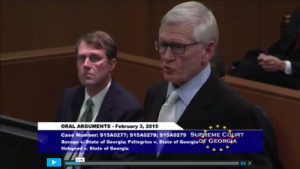Oral Arguments Held over Cobb County Braves Stadium at Georgia Supreme Court
 (APN) ATLANTA — On February 03, 2015, the Supreme Court of Georgia heard oral arguments in the case cases against the bond financing of the construction of the new Braves Stadium in Cobb County.
(APN) ATLANTA — On February 03, 2015, the Supreme Court of Georgia heard oral arguments in the case cases against the bond financing of the construction of the new Braves Stadium in Cobb County.
As previously reported by Atlanta Progressive News, the Braves are planning to relocate from Turner Field in Atlanta, to a new stadium in Cobb County.
Larry Savage v. State of Georgia et al., Richard Pellegrino v. State of Georgia et al, and T. Tucker Hobgood v. State of Georgia et al presented their arguments in hopes that the construction of the stadium would cease and desist. Pellegrino was represented by his attorney, while the other plaintiffs argued on their own behalf.
Pellegrino is a Cobb County activist, whose activities have included involvement with the East Cobb Democratic Alliance, Cobb United for Change, and Citizens United for Transparency; and serving as Director of the Cobb Immigrant Alliance.
The residents argue the trial court erred in validating the bonds, according to a summary issued by the Court.
“Their primary contentions are that the agreement in which the County agrees to pay for the bonds and the Authority agrees to issue the bonds is not a valid intergovernmental agreement; that validating the bonds violates the debt clause and gratuity clause of the Georgia Constitution; that the project is an improper use of public tax money for a private facility; and that the bonds cannot be authorized without a public referendum,” the summary states.
“The power of local government bodies to bind their constituents to long-term debt without ‘the assent of a majority of qualified voters’ for a non-public project like this professional baseball stadium is at the heart of this case,” Hobgood and another attorney write in their brief.
“There are not only statutory prohibitions against ‘any county, municipality, or political subdivision’ incurring debt, bonded or not, without an election, but also a constitutional one,” they write.
“The stadium is not a public project, and the debt incurred by the County is barred by the Constitution’s debt clause. This non-public project also is not authorized by other provisions of the Constitution,” they write.
“The Braves stadium, which is not public in any normal sense of the word, does not qualify as the type of ‘facility’ related to ‘parks, recreational areas, or programs,’” the residents argue.
Black’s Law Dictionary defines “park” as “an enclosed pleasure-ground in or near a city, set apart for the recreation of the public.”
“There is no sense in which ‘parks and recreational areas’ can be stretched to include a facility (professional baseball stadium) run and controlled exclusively for profit by private parties,” they write.
“There is precedent that was made by this court in Sheffield v. State School Building Authority 1952,” under the 1945 State Constitution, Savage told the Justices during oral argument.
“The determination of Sheffield is the very root of this case… The debt clause has an exception regarding intergovernmental agreements; ten percent is the most allowed, except for intergovernmental agreements,” Savage said.
Savage was referring to the bond purchase and validation for financing the new Braves stadium. A bond agreement is not an intergovernmental agreement, which is an agreement between municipalities for services; therefore, the debt clause exceptions cannot apply as it is only meant for true intergovernmental agreements, he argued.
The project should not move forward until the voters have a choice to decide whether they will be on the hook for the stadium financing, he argued.
“The issues are with the County Commission, who should have put this question to the voters. It should have been a vote because of the debt clause,” Hobgood argued.
“The underlying constitutional issue is whether the permitted activity asserted by the County is present here. The county has the power to provide for parks, recreation areas, programming, and facilities. The SunTrust Park Stadium does not fit into that definition. These are private parties who are interested exclusively for profit. It’s against the County power to enter into an agreement, unless they take it to the voters,” Hobgood argued.
One of two attorneys present for the County and Cobb-Marietta Coliseum & Exhibit Hall Authority was Thomas Curvin, who presented the County’s case.
“The Recreation definition states that recreational activity includes amusement, play, or other form of relation that refreshes the mind and body, and this is from Ballentine’s law dictionary,” Curvin said.
“Many facilities in Cobb County and Stone Mountain you have to pay fees. Lake Lanier Islands, managed by a private company, is state property and visitors have to pay fees. The Braves stadium will offer [in addition to the baseball games] three special events, ten days a year, defining it as a recreational area for use by the public,” Curvin said.
“The Authority will own the facility and the operations would be handled by the Braves,” he said.
“What will pay back the bonds?” Justice Harold Melton asked.
“Payments come from general taxpayer funds, plus 6.1 million in licensing fees for use of the property paid by the Braves,” Curvin said.
“Aren’t most bonds being paid by general taxpayers funds which go to a vote? What is your response?” Melton asked.
“The Thompson case allowed for a permissible, full faith and credit through the county,” Curvin replied.
“What is the source of funds?” Justice Melton asked again.
“Tax funds collected by Cobb County,” Curvin said.
(END/2015)
This friend of Pellegrino, Hobgood and Savage awaits the result from Florida. While listening to the case being argued in February, I read the Latin motto on the wall, “Fiat Justinian ruat caelum.” I hope the Court lives up to it.